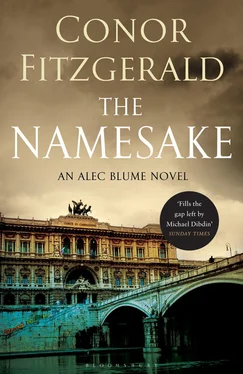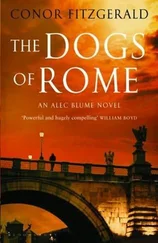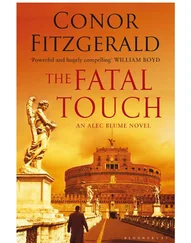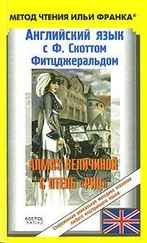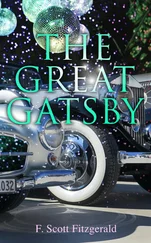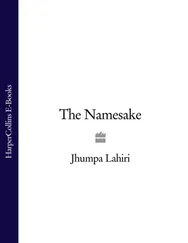Conor Fitzgerald - The Namesake
Здесь есть возможность читать онлайн «Conor Fitzgerald - The Namesake» весь текст электронной книги совершенно бесплатно (целиком полную версию без сокращений). В некоторых случаях можно слушать аудио, скачать через торрент в формате fb2 и присутствует краткое содержание. Жанр: Полицейский детектив, на английском языке. Описание произведения, (предисловие) а так же отзывы посетителей доступны на портале библиотеки ЛибКат.
- Название:The Namesake
- Автор:
- Жанр:
- Год:неизвестен
- ISBN:нет данных
- Рейтинг книги:3 / 5. Голосов: 1
-
Избранное:Добавить в избранное
- Отзывы:
-
Ваша оценка:
- 60
- 1
- 2
- 3
- 4
- 5
The Namesake: краткое содержание, описание и аннотация
Предлагаем к чтению аннотацию, описание, краткое содержание или предисловие (зависит от того, что написал сам автор книги «The Namesake»). Если вы не нашли необходимую информацию о книге — напишите в комментариях, мы постараемся отыскать её.
The Namesake — читать онлайн бесплатно полную книгу (весь текст) целиком
Ниже представлен текст книги, разбитый по страницам. Система сохранения места последней прочитанной страницы, позволяет с удобством читать онлайн бесплатно книгу «The Namesake», без необходимости каждый раз заново искать на чём Вы остановились. Поставьте закладку, и сможете в любой момент перейти на страницу, на которой закончили чтение.
Интервал:
Закладка:
The papers had been picked up off the floor, but were piled haphazardly on the desk. Blume said, ‘I can hardly search through the papers of an investigating magistrate.’ With a slight push, he sent a few files sliding over the desk. A few of them flopped onto the floor.
‘Oops.’ He slipped in the false confession as the sostituto was looking at the floor and swept the fanned-out papers back into an unsteady pile.
‘Look, it’s pointless. If you come across my notebook when sorting through the files, let me know, please,’ said Blume.
The sostituto nodded, uninterested and, it also seemed, unsuspicious.
9
Milan-Sesto San Giovanni
Friday, 28 August
When he had been a young man, he made the mistake of storing 40 million lire in an abandoned house on the outskirts of the town. Foolish youth that he was, he had secreted the cash in a cavity between one of the outside walls and the rotten floor, thinking the plastic wrapping he had put around the bundles of notes would protect them from decay.
He was sixteen and had just been inducted as a picciotto and was only then beginning his apprenticeship to become a sgarrista. For a year he had studied the initiation ceremony, overlearning it till it was like the alphabet or the times table.
— What seek you, young man?
— Blood and honour.
— Have you blood, young man?
— I have blood and I have blood to give.
— Who was the man that told you of the existence of this organization?
— My father, Domenico Megale.
— May the bread become lead in your mouth and the wine you drink turn to blood if ever you betray us…
Once sworn in, he was convinced they would ask him to kill so that his accession from picciotto to sgarrista might be accelerated, as befitted his pedigree. His family had form, history and honour. But they seemed to have no such exalted plans for him. In what was to be the first in a life of insults received, he was entrusted with the mean task of collecting ‘rent’ from shopkeepers. Worse still, they had assigned him to the oldest and weakest, to the most supine, intimidated and accommodating tradesmen, men completely without hope, honour, or courage. He could not understand this failure to put him to the test. Heaping on the indignities, they did not bother to ask him for the pizzo he was collecting from the businesses, yet prohibited him from spending or investing it. And so it was that he stored it in a damp alcove where it sat for three years. He could not bring himself to look at the growing pile of bundles, symbol of his shame, money taken from beings that were less than human. He pushed them deep into the cavity in the wall, and never noticed the mould that bloomed on the banknotes. When he at last pulled out the hidden packets, three-quarters of the banknotes inside had turned into a greasy black sludge. Those that remained were disintegrating.
He prepared himself for death, and reported his incompetence and loss to the contabile of his locale. But his story of the rotten money was greeted with laughter.
‘Burn what’s left, Tony. And find a better hiding place.’
‘I shall repay my debt.’
‘You made an honest mistake, did you not? 40 million lire. That is not even the salary of a hospital administrator. Let’s write it off as capital invested in experience.’
But he did not like the easy laughter that had greeted him, nor the way in which his expectation of death and willingness to accept it had been treated so lightly. For months, rumours about the circumstances of his birth, about his blood, had been circulating. Not only had his natural ascent been blocked, but there was, he could feel it, a collective sniggering behind his back when his name was mentioned.
But he always knew there was one way he could silence all the laughing and sweep away the scorn. When he decided the time had come, he acted without asking his father or his stupid but faithful elder brother Pietro for their opinion or blessing. For who could bless a son who kills his mother? A man who commits an unforgivable sin and shows no fear of certain eternal punishment is a man with no fear. Not only was he prepared for hell fire, he expected it immediately, since his foster father would surely put him to death for what he had done. Instead, they both left the village and transferred to Germany while the story of the boy who murdered his natural mother was quietly absorbed and mythologized by the town.
It had been harder than he imagined to plunge the knife into the old woman. She was sleeping when he came in, and her face was upturned, displaying so many of the fine lineaments of his own: the sharp chin, the tiny ears like two commas, the way the eyebrows swept upwards. When he saw all this, he hesitated, and as he hesitated, she awoke, and spoke his name in a way that filled him with rage, and allowed him to strike. Once she screamed it was easier, and, as when he was killing a suckling pig, the pity and revulsion merged into pleasure and fascination.
The sports bag he was now holding in his hand contained 5,000 euros. The bag and the money in it were to attract the attention of the Romanians, and excite their greedy minds.
He did not despise the two Romanians. He even felt some liking for them. They had carried out his instructions to the letter. It was hard to find reliable people nowadays. If they had not been Romanian, and if the situation had been a little different, he might have eventually put their names forward as potential contrasti onorati, faithful men worthy of being baptized into the organization.
He stood in the shadow of a tall tree that grew straight out of the cement paving. He was standing on what used to be the storage yard of the Falck steelworks, and yet here was a tree as tall as the factory walls fifty yards behind him. He remembered news reports about the works closing in the 1980s. It did not seem possible that the tree could have grown so tall since then.
His car was parked behind a pile of twisted rebar and rubble, out of sight. When the Romanians arrived, all they would see was him and the bag. Two of them in a vehicle, just one of him, on foot, in a wide-open space, ready to part with money and perhaps ready to commission a new job. They would wonder whether he was really alone. Well, he was.
The traffic on the highway made a steady hushing sound like the sea, and, in the tree, two birds of some sort seemed to be squabbling over a single purple berry, pecking at each other, fluttering, hopping on and off the same branch, ignoring the hundreds of other branches and thousands of other berries. The only other sound was the creaking of the steel girders and corrugated roof on the part of the factory that had yet to be torn down.
He heard the diesel engine before he saw the vehicle. Probably the same vehicle they had used to transport the body. Always a van with the fucking Romanians. You never saw a Russian in a van, never saw a Romanian in anything else. It stopped fifty yards away and flashed its headlights. He raised his hand in greeting, bent down, and picked up the bag, held it aloft, then put it down again. Did they think this was a kidnap exchange of some sort? He waved them over. The van drew closer, slowly, suspiciously. He signalled impatience, but saw no increase in speed. Dirty suspicious animals, the Romanians. Gypsy in all of them.
Finally, it stopped and out got Teo. Behind the wheel sat the other Romanian. Teo was upon him, his face all bristles and smiles, his thin cheekbones twitching, his eyes moving side to side.
Tony pointed to the bag on the ground. ‘There you are. You get to keep the bag, too. Pity. It’s Adidas, same as this tracksuit. I bought them as a matching set.’
‘Great,’ said Teo, making no move to retrieve it.
‘You want me to bend down and open it, show you the money?’
Читать дальшеИнтервал:
Закладка:
Похожие книги на «The Namesake»
Представляем Вашему вниманию похожие книги на «The Namesake» списком для выбора. Мы отобрали схожую по названию и смыслу литературу в надежде предоставить читателям больше вариантов отыскать новые, интересные, ещё непрочитанные произведения.
Обсуждение, отзывы о книге «The Namesake» и просто собственные мнения читателей. Оставьте ваши комментарии, напишите, что Вы думаете о произведении, его смысле или главных героях. Укажите что конкретно понравилось, а что нет, и почему Вы так считаете.
